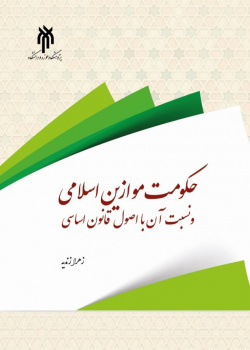

حکومت موازین اسلامی و نسبت آن با اصول قانون اساسی
The Rule of Islamic Standards and its Relationship with the Principles of the Constitution
این اثر پژوهشی بر آن است تأملی در مفهوم، مبنا، حدود و آثار حقوقی حکومت موازین اسلامی بر اطلاق و عموم اصول قانون اساسی داشته باشد. در این راستا، در بخش اول، تبیین کلیدواژگان تخصصی اصل چهارم و تحلیل مبانی حکومت موازین اسلامی بر اطلاق یا عموم اصول قانون اساسی بررسی شده و در بخش دوم، حدود حکومت موازین اسلامی بر اطلاق یا عموم اصول قانون اساسی و آثار حقوقی این حکومت مورد تحلیل قرار گرفته است. بهعلاوه در این نوشتار، به فراخور بحث به جایگاه نظارت شرعی و نظارت پسینی در تحلیل محتوای اصل چهارم، چرایی لزوم حکومت موازین اسلامی بر اطلاق یا عموم اصول قانون اساسی، مفهوم اصول فراقانون اساسی و نسبت آن با اصل چهارم، چگونگی تضمین هنجارهای برتر در نظامهای حقوقی دنیا و تفاوت کاربست نظارت شرعی در مورد قانون اساسی و قوانین عادی پرداخته شده است.
This research wants to have a contemplation on the concept, basis, limits and legal effects of the rule of Islamic standards on the predication and generality of the principles of the constitution. In this regard, in the first part, the technical keywords of the fourth principle and analyzing the foundations of the rule of Islamic standards on the predication or generality of the principles of the constitution were explained. In the second part, the limits of the rule of Islamic standards on the predication and generality of the principles of the constitution and the legal effects of this surmountation have been analyzed. In addition, in this book, in order to discuss the place of Shariah supervision and retrospective supervision in the analysis of the content of the fourth principle, The reason for the necessity of the rule of Islamic standards on the predication and generality of the principles of the constitution, The concept of extra-constitutional principles and its relationship with the fourth principle, How to guarantee superior norms in the legal systems of the world and the difference between the application of Shariah supervision regarding the constitution and ordinary laws has been discussed
